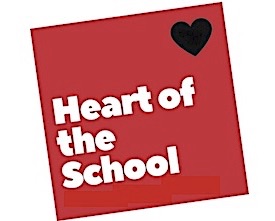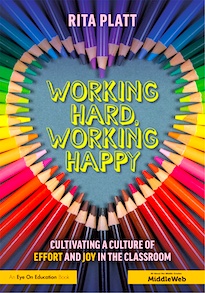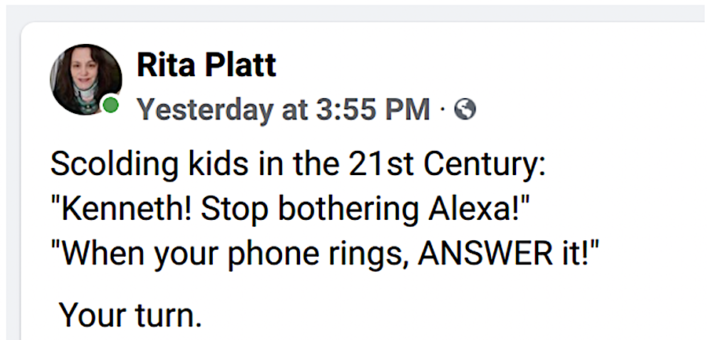Parent Communications Are ALWAYS a Priority
A MiddleWeb Blog

I found myself having to teach my teenage children that when a phone rings, you answer it and say, “Hello!” (When my own boy got his first phone at age 15, I would call and he’d just click the green button and say nothing.)
The other day I was joking about parenting teenagers (I have two of them) on Facebook and posted this:
I share this because I have noticed a trend that despite the many ways educators now have to communicate with the families of the students we serve, communication seems less frequent or intentional than ever before.
I’m not judging or pointing fingers here; if there’s one thing I’ve learned as a teacher over the last 25 years it’s that we all live in glass houses and we must not cast stones at each other. I have no intention of doing that, but I do want to call out a problem as I see it and offer some thoughts and possible solutions.
A Letter to My Teachers
As I often do in my Heart of the School blog, I’m going to start this post with an email I recently sent to my staff. Give it a quick read and then I’ll tell you why I sent it and share a few other thoughts.
Teachers,
A few friendly reminders about communicating with parents.
The DO List:
• Reach out OFTEN! With ClassTag, email, text, and cell/classroom phones, it’s pretty easy to connect. Make it a habit to connect frequently.
• Share good news, photos, fun stories, work samples, whatever! ClassTag makes this quick, and it helps build a strong class community and builds trust with families.
• Reach out to specific parents whenever there is a need. For example, if a student is struggling behaviorally or academically, do NOT wait until conferences or report card time, reach out! Or, if a child is joining a school group (RTI, counseling, whatever), reach out!
• Be kind and nonjudgmental. Honesty is important and so is “bedside manner.”
• Remember that parents send you the great loves of their lives every day and they want their kids to be happy. Sometimes they can get a little defensive. That’s okay. Start with love, end with love.
The Do NOT List:
• Do NOT wait for conferences to talk to parents.
• Do NOT hesitate to confer with me if you have questions, need support, or just want help.
• Do NOT pull kids out of class for any ongoing group without contacting parents.
• Do NOT assume parents know the expectations of the school (for example, home reading or math fact practice).
• Do NOT give up on families or take anything they say/do personally. Learn to be a duck! Let it all roll off your back. More on that here. Our job is to help kiddos. We have to try to let go of our egos and serve them.
Here is a piece I recently wrote for MiddleWeb with more thoughts on communication. Calling Kids’ Folks To Share Good News.
Thanks!
Rita
Communication Breakdown
So, what prompted me to send that email to my very capable and competent staff? Communications breakdowns. Twice this month I’ve encountered problems that led to upset parents that could have easily been avoided with a simple phone call, email, or text message. Once, that upset parent was me! I’ll tell you about both below.
Breakdown 1:
This has been a tough year for all of us educators. In my case, in addition to the regular COVID-caused school changes, I ended up contracting the virus and getting very sick. Then, two months after I finally felt better, it turned out that my degenerative disk disease went into overdrive (due to COVID? I think so…) and I had to have emergency spinal surgery.
Like many parents, I’m a single mother who works full time, has side gigs, and does her daily best to meet the needs of my two wonderful teenage children.
My kids and I are close and spend most of our free time together. We talk about school every day. I help them with homework. But I’m not a hovering mother. I am no tiger mom, and frankly I find the idea of using online platforms to check on my kids’ grades to be invasive and controlling. I read an article about why it’s important to not fall into the “checking your kids’ grades trap” years ago in The Atlantic and never looked back.
The district where my daughter attends, however, uses PowerSchool for all grading and reporting. In fact, paper report cards are not sent home – parents must log in to PowerSchool and check grades. So when it was report card time, reluctantly, I logged on.
My daughter had failed two classes! She had two full-on F’s!
I was flabbergasted. The kid spends the bulk of her day in school. They have a block schedule. The two classes she failed (out of the four she took) were taught by the same teacher. The teacher worked with my child for two 90 minute periods a day. But no one had alerted me to the fact that there was a problem. There was simply no communication at all. When I reached out to the school, the position shared was that it was incumbent on me to check PowerSchool or to rely on my teenage daughter to relay her grade status to me.
Wait a minute. What? What happened to fail notices? What happened to emails? Phone calls? Hand-written notes? What happened to interpersonal communication?
Breakdown 2:
A parent called me last week and asked about the “divorced parent club”* her child was in. She was concerned because her child had grown up in a blended family and never known any different. The child, who is very well adjusted, lives part time with his biological father and stepmother and part time with his biological mother and stepfather. The two sets of parents get along well and frequently the entire group gets together for dinners or other fun activities.

One, they wondered why their child was chosen for the club. (Was he showing signs of distress at school? Was he asking questions at school? Had they missed something?) And two, they wondered why they hadn’t been contacted about him being included in the club in the first place. If they had, they said, they would have gently declined.
I questioned those things too. Those questions led to productive conversations with my staff and the email you read above.
Simple Solutions for Positive Communication
The big takeaway is that we can’t forget that communication is a part of our job. Even when we’re super busy. Even when it’s uncomfortable. We have to reach out early and often. To make any of the best practices or current educational trends work for our students, high quality communication has to be a foundational principle of our practice.
PowerSchool and other online gradebooks/LMS (learning management systems) are a great way to share some things, but they cannot and should not be the be-all, end-all of any teacher’s communication plan. They are cold, impersonal, and can only share non-nuanced data.
Honestly, a good first place to look for solutions is in the DO and Do NOT list in the email I sent my teaching staff (above.)
The bottom line is that interpersonal communication still matters. Read the three questions below.
- If this student was my kid, would I want to know….?
- If this student had been me, would my parents have wanted to know…?
- If I communicate with this kid’s family, might it save some angst for the kid, the parent, or me down the road?
If you answer yes to one or more, reach out. Call. Email. Text. Message. Write a note. Whatever! Just communicate.
_____
* I also questioned the need for such a “club” at all. I mean it’s 2021. Lots of parents are divorced. I am and my kids are doing very well (aside from those two Fs), thank you very much! It turned out there was no such club and no such name for it. It was a group of kids who met for lunch with the school counselor. All of the kids were from families of divorced parents, and it was a frequent topic of conversation.
































